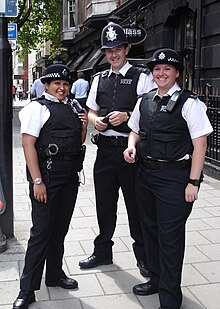This article needs additional citations for verification. (July 2009) |
 Metropolitan Police officers in London | |
| Occupation | |
|---|---|
| Synonyms | policeman (PL: policemen) policewoman (PL: policewomen) |
Activity sectors | Law enforcement
public safety, civil service, public service, rescue, protection of private property |
| Description | |
Education required | Secondary or tertiary education |
Fields of employment | Public areas |
Related jobs | gendarmerie, military police, security guard, bodyguard, detective, immigration officer |
A police officer (also called a policeman (male) or policewoman (female), a cop, an officer, or less commonly a constable) is a warranted law employee of a police force. In most countries, "police officer" is a generic term not specifying a particular rank. In some, the use of the rank "officer" is legally reserved for military personnel.[1]
Police officers are generally charged with the apprehension of suspects and the prevention, detection, and reporting of crime, protection and assistance of the general public, and the maintenance of public order. Police officers may be sworn to an oath, and have the power to arrest people and detain them for a limited time, along with other duties and powers. Some officers are trained in special duties, such as counter-terrorism, surveillance, child protection, VIP protection, civil law enforcement, and investigation techniques into major crime including fraud, rape, murder, and drug trafficking. Although many police officers wear a corresponding uniform, some police officers are plain-clothed in order to pass themselves off as members of the public. In most countries police officers are given exemptions from certain laws to perform their duties. For example, an officer may use force if necessary to arrest or detain a person when it would ordinarily be assault. In some countries, officers can also violate traffic code to perform their duties.[2]
- ^ Rfletcher. "Understanding the Roles of Military Officers and Enlisted Service Members". Military OneSource. Retrieved 6 April 2024.
- ^ Dulaney, W. Marvin (1996). Black Police in America. Indiana University Press. p. 21. ISBN 0-253-21040-2.